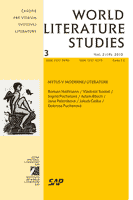Barthes, Kundera a Gombrowicz
Barthes, Kundera and Gombrowicz
Author(s): Jakub ČeškaSubject(s): Literary Texts
Published by: Ústav svetovej literatúry, Slovenská akadémia vied
Keywords: Structuralism. Demystification. Comparative Literature
Summary/Abstract: Barthes, Kundera and Gombrowicz share an aspiration towards demystification. Each of them applies it in a different way. Although we might expect Kundera and Gombrowicz to share the novel technique, instead there appears to be a strong affinity between Kundera and Barthes (in the hidden, ideologized rhetorical gesture) against which Gombrowicz stands as their anti-thesis. Even though Barthes speaks in various places about the danger of the solidification of writing, it is possible to observe this solidification (through ideological fortification) both in him and in Kundera. Probably because their positions are not rigorously examined (they are reflexive, but not self-reflexive), since they apply the demystifying demand only to their rivals (bourgeois myths – i.e., the editor, lyricism, romantic clichés...), but never to their own position, from which they execute their criticism. This is different in Gombrowicz, who not only refuses to ideologically fix the signs of literature, but his position is moreover selfreflexive (it defies solidification). His straightforward, exaggerated literary gesture is therefore only seemingly disrespectful, because it is open.
Journal: World Literature Studies
- Issue Year: II/2010
- Issue No: 3
- Page Range: 63-74
- Page Count: 12
- Language: Czech

